
Well, there you have it – blogging has finally breathed its last breath! Time to toss SEO out the window and forget about your loyal audience, because blogging is dead. Seriously, the most successful companies are ditching blog writing altogether.
With the overwhelming wave of video content captivating audiences globally – 92.3% of internet users in 2023, to be exact – who bothers with the written word anymore? Yawn!
Today, we’re exploring why blogging is dead, and how you can start taking advantage of new (and better) innovations, like ChatGPT, that will do all of your writing for you. Say goodbye to your content strategy and bid farewell to your marketing director!
Image Source: Giphy
Just kidding! April Fools!!! If you bought into our silly prank, you can breathe easy. Blogging is far from dead. In fact, it’s more important than ever. In this article, we’re actually kicking marketing myths to the curb, including the notorious “blogging is dead” narrative.
Quick Takeaways
- ChatGPT won’t kill SEO; it can enhance it by generating keyword-rich content and ideas, but a strategic human touch is essential for effective SEO and content creation.
- Blogging is a powerful tool to build trust and establish credibility with your audience, positioning you as an industry thought leader.
- While ChatGPT can assist in content creation, it lacks the human element necessary for truly engaging and resonant blog posts.
- Human bloggers bring personal touch, emotion, and connection to content, which automated tools cannot replicate, making them irreplaceable in creating meaningful engagement.
1. ChatGPT Will Kill SEO
Rumor has it that with access to ChatGPT, you can toss your SEO strategy. If you’ve done any research surrounding the topic, you already know this isn’t the case.
Although, you can use ChatGPT to help create content that drives traffic from search engines. Trying using ChatGPT as a brainstorming tool and ask for a list of keywords related to your industry:
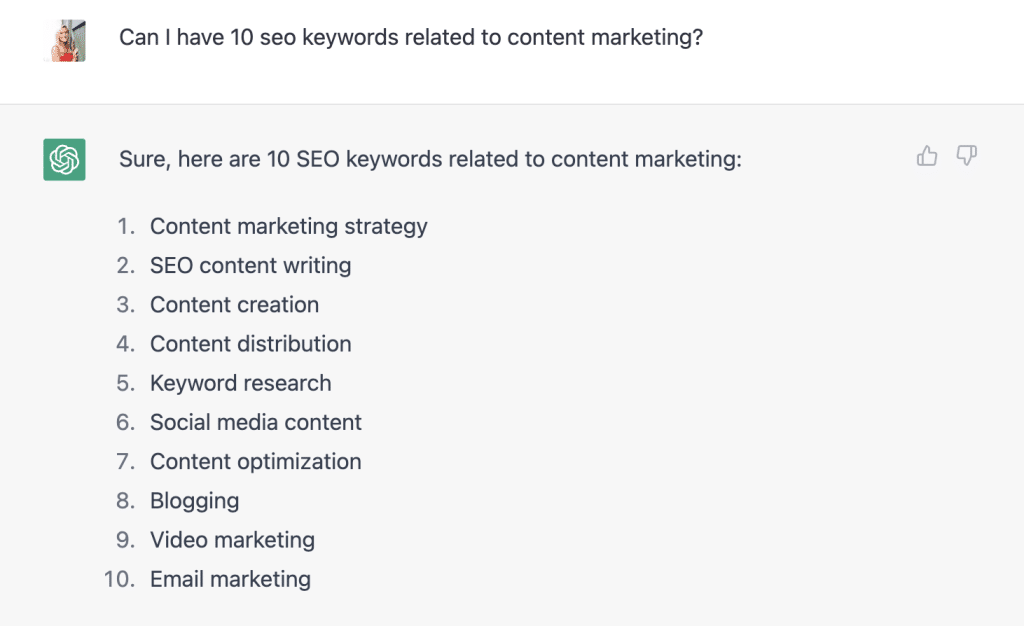
Image Source: ChatGPT
For a more specific answer, ask ChatGPT for topic-related:
- Glossary terms
- High-level concepts
- Niche categories
- Common customer questions
With access to these kinds of AI-generated suggestions, you have a great starting point for building an SEO strategy that delivers first-time buyers. Then, we recommend using your SEO strategy to start creating blog posts that rank on SERPs.
2. Audience Trust is Overrated
Would you trust someone you barely know? No, we wouldn’t either.
In order to secure conversions, you need to work hard to build trust with your audience and credibility within your industry. And what’s the best way to build trust with your audience? All together now…blogging! See? We told you it wasn’t dead.
Blog posts are a cost-efficient, effective way to:
- Nurture your audience
- Provide expertise
- Give advice
- Share reliable information
- Answer questions
Using your blog page to complete the tasks mentioned above positions you as a thought leader in your industry, earning trust from both your target audience and other industry players.
3. ChatGPT Will Write Your Content
Although it’s true that ChatGPT will write your blog content, that doesn’t mean it’s a good idea. Do you remember our article on Google’s most recent “helpful content update”? It says that AI-generated content isn’t well-received by Google’s algorithm, meaning any content written by robots is super unlikely to rank well on SERPs.
Not only that, but ChatGPT doesn’t have the capacity to know exactly what kind of content offers value to your audience.
Moral of the story: feel free to utilize ChatGPT-generated content as a guide, but opt for a human skill set to make sure your content is both entertaining and helpful to readers.
4. Anyone Can Be a Great Blogger
While we believe it to be true that anyone can have a great blog page, we can’t say with confidence that anyone can be a great blogger.
Writing high quality content for a specific target audience takes marketing expertise and great writing skills. If your blog page isn’t generating the results you hoped for, you need to question your content’s:
- Quality/value
- Writer
Hiring writing experts will knock blogging off of your “to-do” list. You’re not the only one who doesn’t have enough time to crank out high quality blog posts – 52% of bloggers struggle to find the time to create and promote their content.
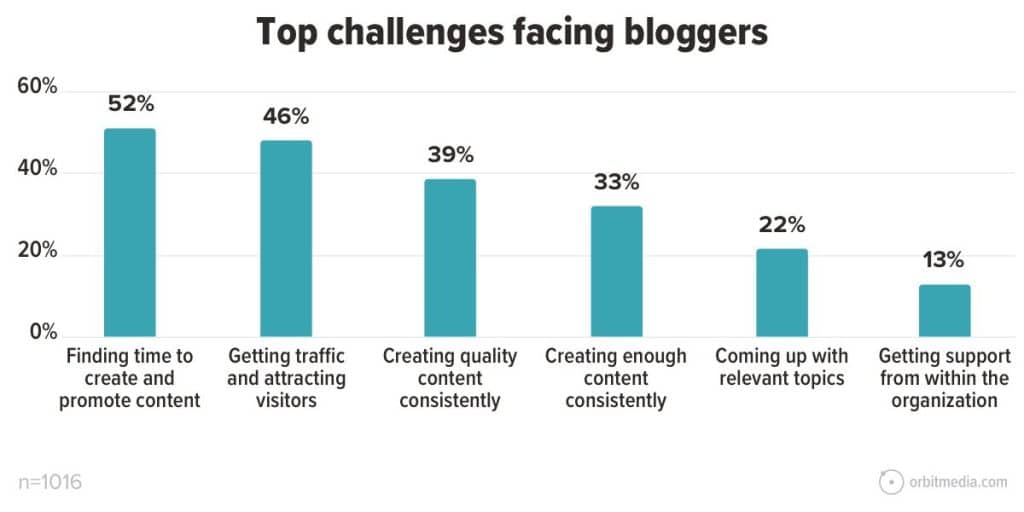
Image Source: Orbit Media
Give yourself a break and outsource your content creation. It guarantees consistent, well-written, valuable content optimized to perform well on search engines.
5. ChatGPT Will Think for Your Business
By now, I’m sure you know that this is also untrue. Sure, ChatGPT can answer your most challenging questions in seconds, but you have to wonder… are its answers accurate?
We hate to be the bearer of bad news, but the answer is no – not necessarily. The word on the street is that ChatGPT users need to be wary of its credibility, admitted by ChatGPT itself:
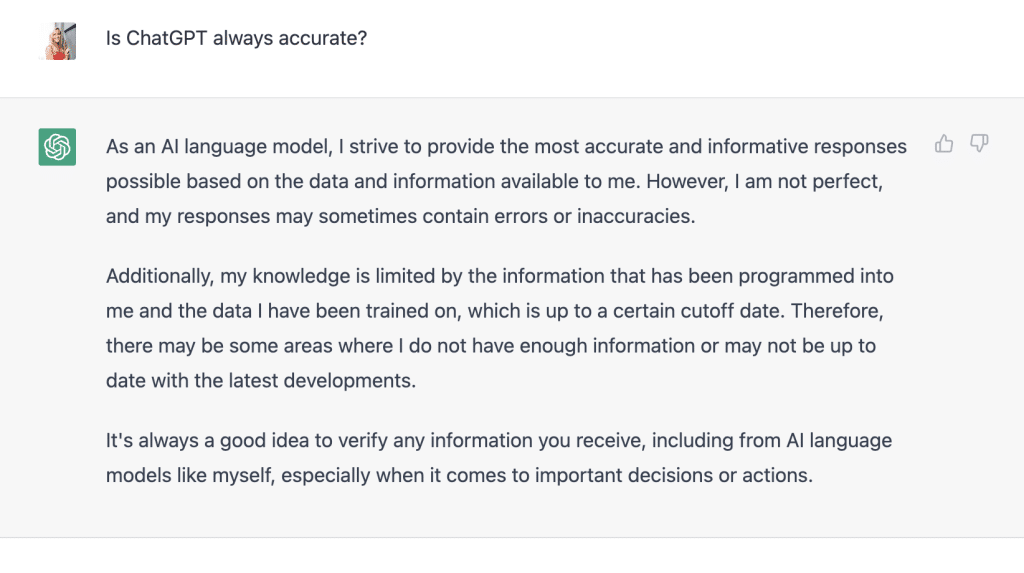
Image Source: ChatGPT
Although ChatGPT was trained on an extensive amount of information before its release, it hasn’t been trained to confirm its own accuracy. Instead, it focuses on providing coherent responses to user inputs.
So obviously, it’s not a great idea to let ChatGPT do all the thinking. Be sure to fact-check its answers before handing over your trust, and stick to using ChatGPT for things like template, outline, and keyword creation.
6. Great Businesses Generate Enough Leads Without Marketing
Word-of-mouth marketing may be the oldest trick in the book, but that doesn’t mean it’s the most reliable. Intentional lead generation is crucial for your business’s success, and overlooking its importance could cost you your company’s survival.
Luckily, generating new leads doesn’t have to be hard. In fact, if you get your SEO right, it’s pretty simple.
By optimizing your blog content to rank for keywords on SERPs, you’ll drive more organic traffic (and qualified leads) to your website. In fact, B2B marketers reported that blogging caused their lead generation to increase by 67%.
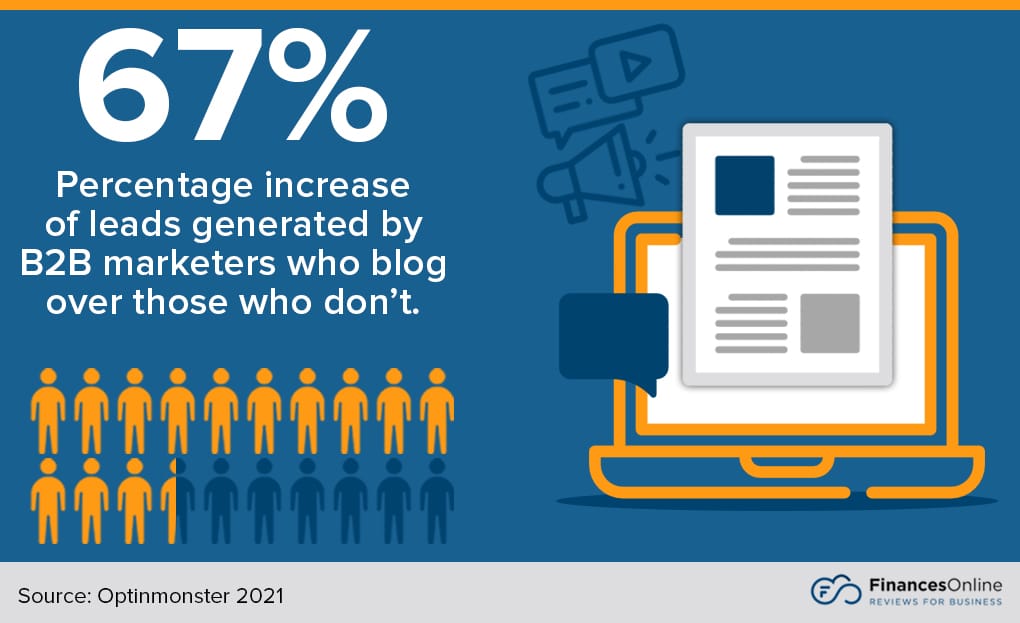
Image Source: Finances Online
Once new site visitors realize how much value your company offers, they won’t be able to resist the idea of making a purchase.
See how that works? High quality content = high rankings = qualified leads = conversions! Piece of cake.
7. Your Readers Will Engage Without Being Prompted
Not so fast! New customers aren’t itching to spend their money, and they don’t know that your products and services can solve their problems, either. Not only that, but you’re also 70% more likely to convert re-targeted visitors vs. new ones. This means that it’s your job to lead prospects down the right path: towards making a purchase.
How do you do that? By educating your audience via blog content. Blog posts are ideal for:
- Sharing tips
- Providing how-tos
- Telling your brand’s story
- News reporting
- Sharing success stories
All of which will draw your readers in and initiate a desire to learn more. Simply include a great CTA at the end of each blog article or in the second column of your blog page, and watch the conversions roll in.
8. Blogging Can’t Compete with Video Content
Some people say that blogging has taken a backseat to video content. But, let’s be real – that’s far from the truth.
Don’t get us wrong. We love a good video just as much as anyone else. In fact, a recent study shows that 86% of businesses use video as a marketing tool. The same study also highlights that viewers retain 95% of a message when they watch it in a video compared to 10% when reading it in text.
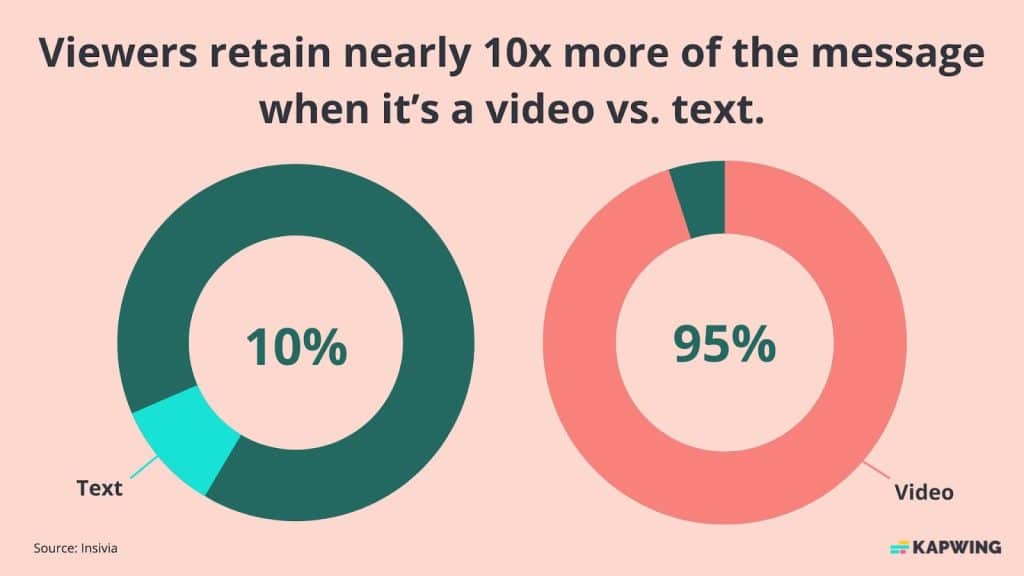
Image Source: Kapwing
But wait a minute before you ditch your blog for a camera. Blogging holds its own unique superpowers. It’s the king of SEO, for starters. Search engines favor fresh, relevant written content and reward it with higher rankings. And let’s not forget the personal touch a blog brings. It’s a space where you can share your voice, your insights, and your expertise in a way that’s uniquely you.
While videos might win in capturing immediate attention, blogs are the marathon runners, building:
- Trust
- Authority
- A loyal audience
They’re also your best bet for in-depth explanations, detailed guides, and those all-important keywords that help people find you in the first place.
So, is it really a competition? We don’t think so. Both blogging and video content are vital players on the same team, each with its own role in winning over your audience and boosting your brand. Let’s not pit them against each other, but rather use each to complement the other, creating a content strategy that’s twice as powerful.
9. Blogging Is Only for SEO
Sure, SEO loves a good blog, but reducing blogging to just an SEO tool? That’s selling it way short.
A blog is a direct line to your audience. It’s where you share not just what you do, but who you are. Through your blog, you:
- Offer insights
- Share knowledge
- Spark conversations
It’s a place where your brand’s personality shines, engaging readers and turning them into followers, and eventually, loyal customers.
Now, think about trust. Your blog builds this trust by providing valuable, reliable content. When you consistently offer helpful information, you’re not just boosting your SEO; you’re establishing your brand as an authority in your field. People come to you not just for products or services, but for insights and expertise.
Let’s not forget about the versatility of blogs. They’re not one-trick ponies. Blogs serve multiple purposes: they educate, inform, entertain, and inspire. Whether it’s industry news, how-to guides, or thought leadership pieces, your blog can wear many hats, each attracting a different segment of your audience.
And, here’s a little secret: While blogs are great for attracting new visitors, they’re also fantastic for keeping existing customers engaged. Your blog keeps people coming back for more, fostering a community around your brand.
10. Automated Content Creation Will Replace Human Bloggers
There’s a buzz going around that automated content creation is set to take over the blogging world. But let’s hit the pause button on that thought. While AI and automation are certainly making waves, they’re not about to replace the human touch that’s at the heart of great blogging.
Sure, AI tools are pretty nifty. They can churn out content at the speed of light. But they lack the personal touch, the emotion, and the genuine connection that human writers bring to the table.
Think about your favorite blogs. What draws you in? It’s the personality, the unique voice, and the perspective that feels human, right? It’s about sharing experiences, sparking thoughts, and sometimes, just making you smile. That’s the magic human bloggers bring, and no AI can replicate that (at least, not yet).
When you read a blog post that resonates, it’s often because the writer has shared a personal story, an insight, or an opinion that strikes a chord. This human element fosters a connection that automated content just can’t achieve.
Now, we’re not throwing AI under the bus here. It’s a fantastic tool for assisting with research, generating ideas, or even helping with language translation. But when it comes to creating content that engages, inspires, and builds relationships, human bloggers are irreplaceable.
Blogging Is (Far From) Dead
By now, you know that ‘blogging is dead’ couldn’t be further from the truth. Blogging remains a powerful tool for driving traffic, attracting qualified leads, and boosting conversions for your company.
Ready to elevate your content marketing game?. At Marketing Insider Group, we know how to generate conversions with high quality content. Check out our weekly blog content service to get started, or schedule a free consultation now to learn more!



0 Commentaires